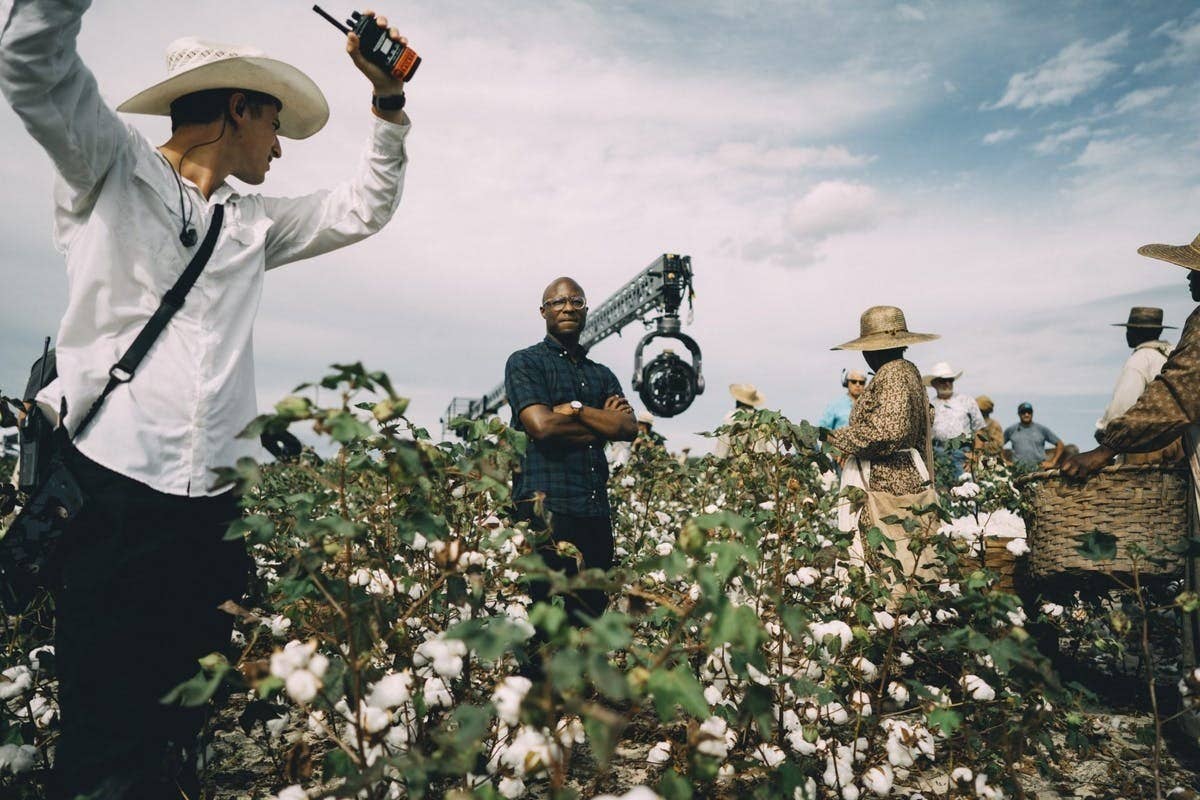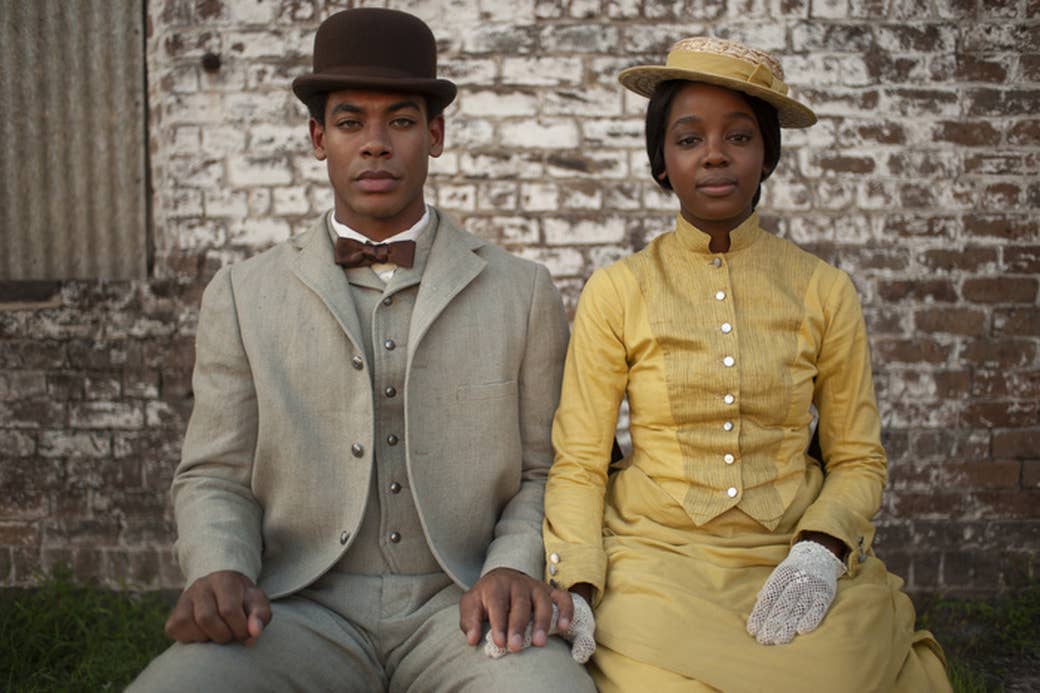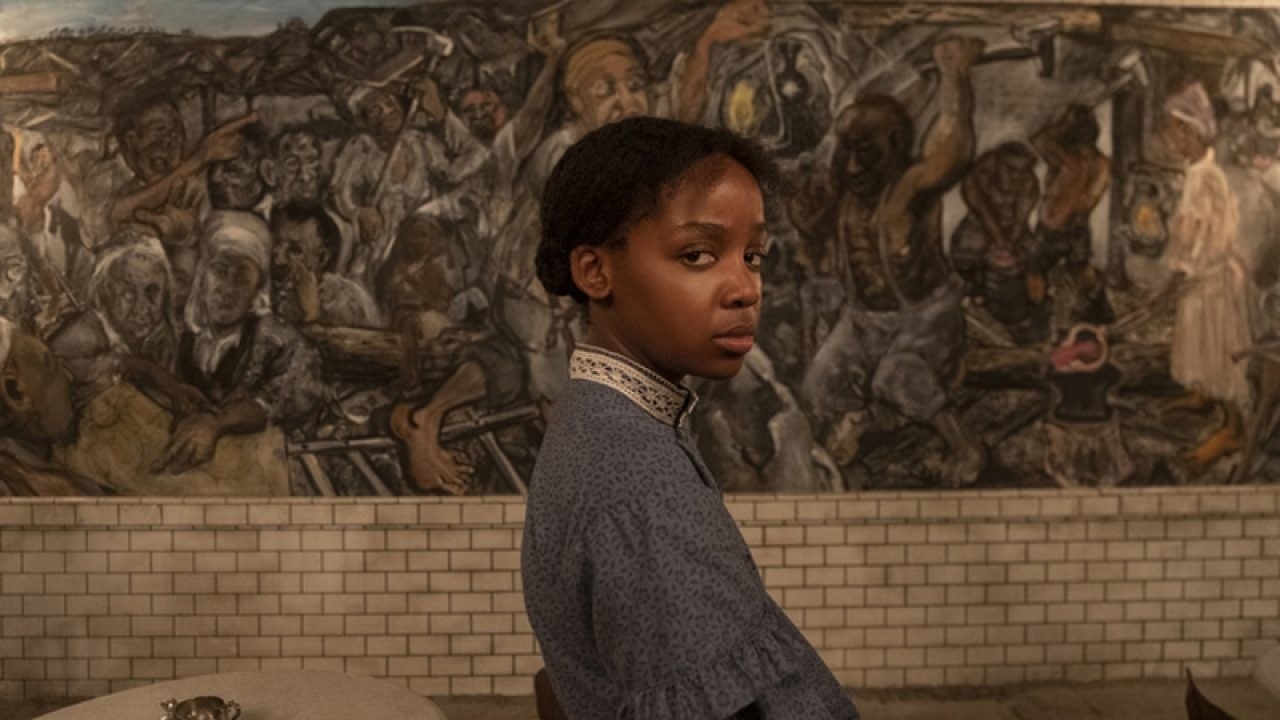
Haunting reality meets vigorous fantasy in Barry Jenkins’ agonizing TV adaptation of Colson Whitehead’s Pulitzer Prize–winning novel, The Underground Railroad. The new Amazon drama may be the Oscar-winning filmmaker's first television venture, but each episode has the cinematic power of a stand-alone feature as it chronicles the harrowing 19th-century journey of an enslaved woman’s road to freedom in a fearless examination of the USA’s ugliest era.
The Underground Railroad transforms the historic euphemism for the network of people and safe houses helping enslaved people escape the Antebellum South into a literal, engineered train line carrying people to safety. In particular, it scrutinizes the ghastly experience of Cora, who has run away from slavery, played phenomenally by South African actor Thuso Mbedu.
Jenkins’ 10-part anthology series opens on a Georgia plantation and makes its way through North and South Carolina, Tennessee, and Indiana, each state showcasing its own pre–Civil War nuances and dark burdens. The show is an elegiac and, at times, triggering watch — a fact of which Jenkins tells me he’s well aware when we catch up to discuss his process.
“I want you to call a friend...man, seriously,” he says with genuine concern when I admit I blazed through the entire series the night before our interview. “You’re going to need someone to talk to after consuming that so quickly.” His concern is valid.
Thanks to Jenkins’ vigilantly balanced portrayal of excruciating racist violence and blissful joy, The Underground Railroad avoids accusations of exploiting Black trauma for which other shows — like Little Marvin’s Us-inspired horror series Them — have recently been criticized. But there’s no denying the emotional toll the show will take, particularly on its Black viewers.
“I grew up in this country, and I know the sensitivities around these kinds of images,” Jenkins tells BuzzFeed News. “I know how triggering they can be, and so I knew that of all the things I've ever done, it was going to take an even more heightened level of responsibility from me and my treatment of these images when creating this.”
“Over the four years that I worked on this — from first reading the book to actually stepping onto set — there was this president who kept talking about ‘Make America Great Again,’” he continues, referencing former US president Donald Trump. “And I realized that there was this vacuum that kept traveling that needed to be filled. Because America hasn’t always been great.”
“There are some very prolific, traumatic things in American history,” Jenkins goes on. “And somehow, because we've been afraid to reexperience some of these traumas, because we've been afraid of triggering people to reexperience that trauma, we've inadvertently almost avoided some of this history.”

The Underground Railroad doesn’t veil America’s repulsive past, nor does it make it palatable. Instead it raises a magnifying glass to the barbaric treatment of enslaved people, using Joel Edgerton’s villain Ridgeway, a vicious man who tracks down and returns escaped people to their enslavers, to characterize the dominant white superiority rhetoric of the time.
Much like Misha Green’s Lovecraft Country — though less extreme — the show maneuvers between hard-hitting reality and whimsical fiction. In the first episode, we’re shown the whipping, hanging, and burning of enslaved people on a plantation. We’re then whisked into the fantastical realm of a secret subway system that transports Cora and her friend Caesar (played by Aaron Pierre) to South Carolina. On the surface, the state feels like a Utopian safe haven, where Black people are accepted. But quickly, it reveals its horrifying foundation.
“When I was a kid, the first time I heard about the underground railroad, I imagined Black people on trains underground,” Jenkins says. “This was before I knew about comic books — it was before Black Panther — so for me, it was like these people, my ancestors, were superheroes. But then like Santa Claus, you learn that no, it wasn’t an actual phase on the ground. Although the real thing was still amazing, I never got that feeling back.”
“I was a big fan of Colson, and when I heard that he had written this book, before Moonlight [his Academy Award–winning directorial debut] premiered, I finally got that feeling again,” he adds. “That’s when I knew it was the one — especially because I’d always wanted to tell a story about American slavery.”
"As prepared as I thought I was, there was a moment where I just had to walk off set."
Still, Jenkins admits, there were challenging moments for him on set. “As filmmakers, we've done this so much that you kind of know how to compartmentalize and prepare yourself,” he tells BuzzFeed News. “However, there were a few scenes… Even though you're on location, there's no blood, there's no fire, the actor is in a harness, he's not actually suspended — yet because of the setting, and the commitment of the actors, it kind of overwhelms you.”
“Even as prepared as I thought I was, there was a moment where I just had to walk off set,” Jenkins says. “I didn’t tell anybody. I just walked off.”
Aware of the mental health repercussions of depicting trauma, the team had a therapist on set at all times throughout filming, who the cast and crew affectionately called Miss Kim. “As the director, I can always call cut and action,” Jenkins says. “But Miss Kim superseded me. There were times where she would call cut and she would pull this actor, or this crew member, or in a few cases she would pull me aside and be like, ‘You need to protect yourself. How are you doing? Let’s talk.’ And we’d go through it together.”
Jenkins’ cinematography is breathtaking, but the show’s real magic lies in Thuso Mbedu's portrayal of Cora. Her performance as a brave yet fragile and ferociously determined young woman who is scorned by the neglect of her mother — the only enslaved person to ever successfully escape the wrath of Ridgeway, moments after giving birth to her — is one that’ll strike your soul.
“Working with Thuso was amazing,” Jenkins tells BuzzFeed News. “I don’t know if she uses this as a method, but Thuso is from South Africa and this is her first extended period of time in the States. So she’s making this show, and she’s away from all of her friends and family. Then you have Cora, who is also away from all of her friends and family too.”
Cora has been hardened by life, but is far from numb. She displays an outpouring of emotions from the moment we’re introduced to her, as she jumps out to protect Chester, a young boy on the plantation, from the strikes of their enslaver, Terrance Randall. She represents a symbol of hope in its realest form; she’s both fearful and fearless at the same time. It’s a tough task for any actor to take on, but Mbedu does it brilliantly.

“The beautiful thing about Thuso is that she's such a wonderful personality,” says Jenkins. “People just attached themselves to her. She’d be hosting game nights at her house on the weekends, and she’d organize these bowling trips with the crew. But what made her perfect for this role was that the experience with my ancestors and the particular experience of this character... The things they saw aged them so rapidly, emotionally and spiritually. So I wanted someone who could look 16 and who could look 56. Depending on where she is and what episode, Thuso looks 16 or she looks 56, and it’s not makeup; it's just that she’s really channeling what Cora is in that specific moment. I’m just so glad we found her.”
"It takes the condition she is in and places it to the side, while placing her as a human being at the center of the story."
In its entirety, The Underground Railroad feels more truthful than it does exploitative. The dialogue is at times poetic but always feels authentic, while the gaze of the camera is carefully considered. Even in its most grotesque scenes, it is far removed from the voyeuristic nature the show could so easily have fallen into.
“The main thing I want viewers to take away from this is that in the States right now, we're trying to reprogram ourselves not to refer to our ancestors as slaves, but as enslaved human beings,” Jenkins says. “I think when you do that, you block out this big word — ‘slavery’ — that just kind of overwhelms everything, and you get to the human being.”
“This whole show is driven not by Cora's attempt to free the condition of slavery, but by this broken heart she has because she feels abandoned by her mother,” Jenkins says. “That's a really important thing. It takes the condition she is in and places it to the side, while placing her as a human being at the center of the story.”
He goes on: “I want people to see that our ancestors — despite this horrible condition that they were forced to endure — they still had very full and rich lives.”
